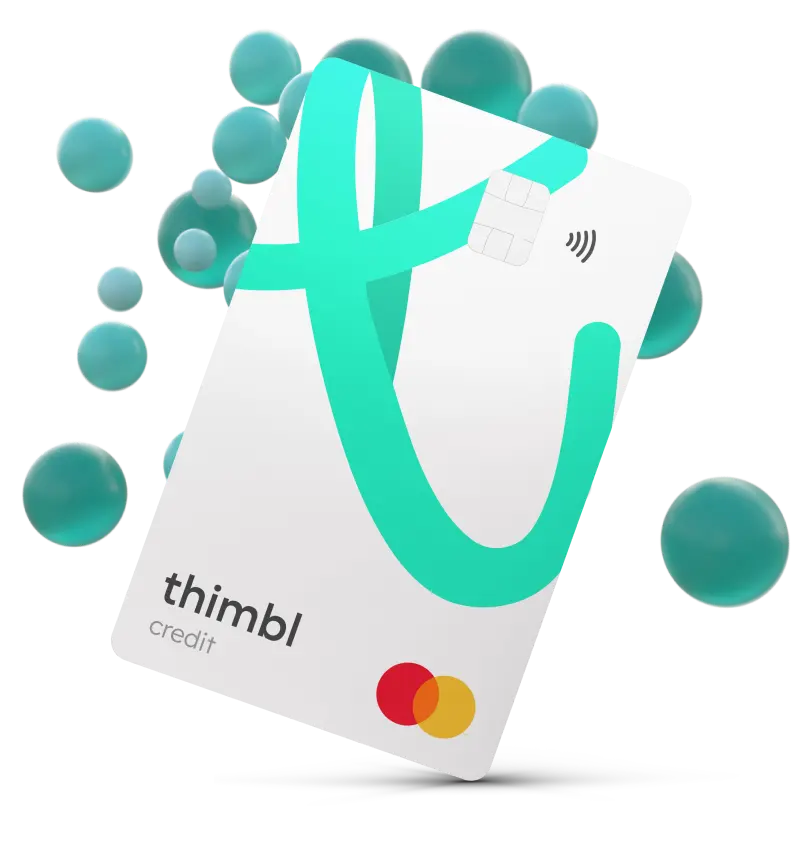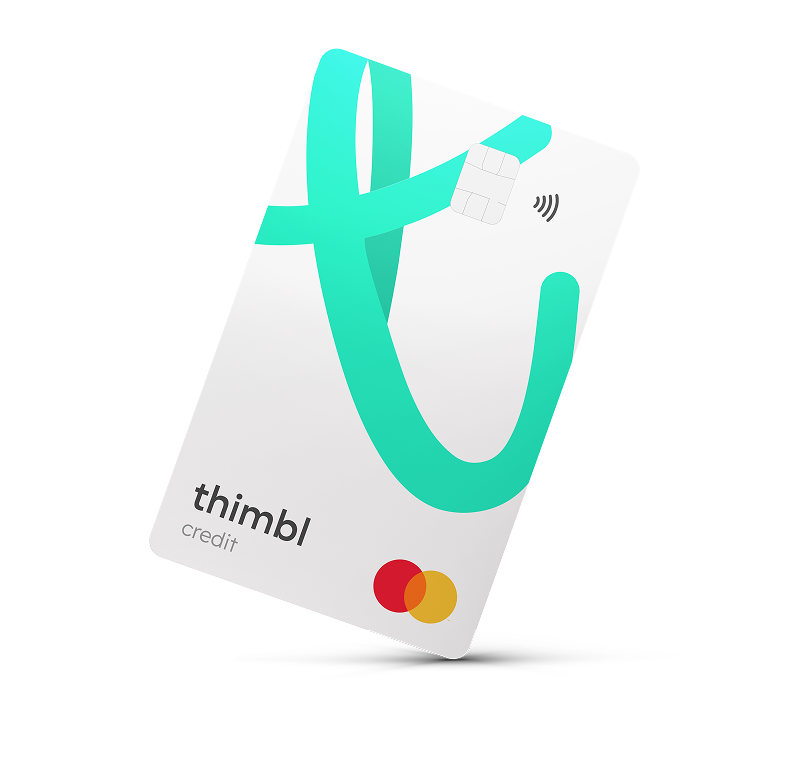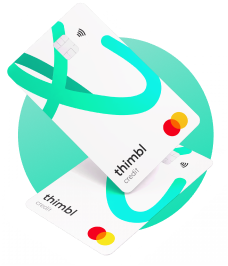Credit Cards to use Abroad
Travel Credit Cards
 Discover your options when spending abroad
Discover your options when spending abroad No fees when you use the thimbl credit card abroad
No fees when you use the thimbl credit card abroad Check if you're eligible with no impact to your credit score
Check if you're eligible with no impact to your credit score48.9% APR Representative (variable)
Subject to affordability



 For all credit scores
For all credit scores
 Check eligibility with no credit score impact
Check eligibility with no credit score impact


Are you heading overseas? Whether you’re travelling for business or leisure, you might have some questions about how to make purchases while you’re abroad.
- Is it better to use a credit card or debit card when travelling abroad?
- Will I be charged for using a credit card abroad?
- How can I avoid credit card fees abroad?
The thimbl guide to travel credit cards explains what they are; how they may be useful, and who could be eligible to apply for one.
What is a travel credit card?
A travel credit card could be an option to consider when thinking about spending money abroad, as these types of credit card may offer no or low fees on your holiday spending.
When you spend money on a travel credit card overseas, the payment will be converted into pounds sterling at the credit card provider’s current exchange rate. This could be lower than the rate offered by the retailer.
- For all credit levels, from poor to excellent
- Checking won’t affect your credit rating
- 48.9% APR Representative (variable)

Is a travel credit card the same as a prepaid travel card?
A travel credit card should not be confused with a prepaid travel card.
Think of a prepaid travel card as buying your holiday spending currency but securing it on a card rather than carrying around the physical cash. You can add one or more currencies to your prepaid travel card, and depending on the provider, you may also be able to top it up if you need to.
You won’t need to undergo a credit check to apply for a prepaid travel card as this is not a credit product; you’ll usually just need to be over the age of 18 and able to provide proof of your identity and address.
In our guide, we will be focusing on travel credit cards, rather than prepaid travel cards.
Is it better to use a credit card or debit card when travelling abroad?
It’s entirely up to you whether you use a debit card or credit card while abroad.
It’s worth noting that many providers of both credit and debit cards will charge a fee when you make a transaction or withdraw money from a cash machine overseas. Fees will vary between providers, so it’s worth familiarising yourself with these before you go, so that you’re not caught out by any nasty surprises.
Any overseas payments that you make may incur a ‘non-sterling transaction fee,’ which could be up to 3%. For example, if you spent £25 on your debit or credit card with a 3% non-sterling transaction fee, you would be charged a total of £25.75. There may also be a minimum fee applicable, which you should be able to find in the terms and conditions of your product.
In addition to this, some debit card providers may also charge a flat fee for each transaction made while abroad. Again, the rate of the flat fee will vary between providers.
Things to think about before you apply for a travel credit card
- A credit card is a serious financial commitment and the decision to apply for one should not be taken lightly. You should be confident that you’ll be able to repay any money you borrow; you should also consider how you’d keep on top of your repayments if your financial circumstances were to unexpectedly change.
- You’ll need to make at least the minimum repayment amount due on your credit card each month. Where possible, you should try to make more than the minimum amount. If you repay your balance in full and on time each month, you won’t be charged any interest.
- A credit card will affect your credit score. Making a late repayment, or missing one altogether, will damage your credit score, whereas making your repayments on time each month, staying well within your credit limit, and keeping your credit card utilisation low could lead to an improvement in your score over time. When working towards improving your credit score, you should also ensure that any other credit commitments and bills are repaid on time.
- Using your credit card to withdraw money from a cash machine, known as a cash advance, could lower your credit score. A cash advance may signal poor money management and might be viewed negatively by potential lenders and credit providers. On top of this, a credit card cash withdrawal will incur a fee; this is the case for spending both at home and overseas.
- If you make an application for a travel credit card, a hard search will be carried out as part of the provider’s affordability checks. A hard search will remain visible on your credit file for up to 12 months, and multiple hard searches within a short period of time could have a negative effect on your credit score.
Who can apply for a travel credit card?
Every lender will have their own eligibility criteria, which must be met before you make an application.
Generally, you must:
- Be over the age of 18;
- Be a UK resident. Some providers may require three years’ worth of UK address history;
- Have a UK bank account with a valid debit card; and
- Have a regular source of income paid into your bank account.
Can I get a travel credit card with bad credit?
Getting approved for a travel credit card could be difficult if your credit score is on the low side.
Some providers of travel credit cards may only consider applications from people with good credit history.
If you’re unsure, some providers may offer an eligibility check, which would reveal your chances of approval before you apply.
The best travel credit cards in the UK
When searching for the best travel credit cards for your personal circumstances, there are several things that you might like to bear in mind.
- Annual percentage rate (APR)
The APR reflects the overall cost of borrowing per year. The APR includes any standard account fees associated with the credit card. It does not include any additional fees, such as late repayment fees.
- Exchange rate
When looking into various travel credit cards, it could be a good idea to compare the different exchange rates of each product, although you should be aware that exchange rates could be subject to change.
- Promotional offers
It’s possible that some travel credit cards could come with an initial low or 0% interest offer on purchases made during a promotional period. If you opt for a credit card offering this, it’s important to keep track of when the introductory offer expires. Any balance outstanding once the promotional period comes to an end, as well as any future purchases you make, will be charged interest at your standard interest rate.
- Additional rewards
Some travel credit cards may come with additional perks on overseas spending, such as cashback or points that can be exchanged for discounts on flights and hotels. Depending on what you want to get out of a travel credit card, this could be a contributing factor in your decision-making when looking for the best travel credit card for you.
When abroad, should I pay in local currency or pounds sterling?
When making a credit or debit card transaction abroad, you may be offered the choice of paying in either local currency or pounds sterling.
You may be tempted to pay in pounds sterling as this is likely to be the currency you’re familiar with; however, opting to complete your payment in local currency instead could save you money in fees.
When you pay in local currency, the exchange rate will be set by Mastercard, Visa, or American Express, and could be more desirable than the rate offered by the retailer.
I’m heading abroad; do I need to let my bank know that I’m going on holiday?
It’s a good idea to let your bank know that you’re going abroad. Sometimes, using your debit or credit card abroad can trigger fraud detection, which may result in your card being declined or blocked.
You can usually let your bank know about your upcoming trip using your mobile app or online banking account. This process should take no longer than a couple of minutes; usually, you’ll just need to provide your dates of travel and the country or countries you’re planning to visit.
What happens if I can no longer afford to repay my credit card balance?
If you’re having difficulty managing your credit card repayments, you should speak with your provider. They may have suggestions to help ease some of the pressure.
If you are struggling with money you can access free, impartial money and debt management advice on sites such as StepChange, MoneyHelper, Citizens Advice, and National Debtline.

Page last reviewed: 23rd December 2024
Page reviewed by: Alex Kosuth-Phillips
You get all this with thimbl
Tap and go
Quick and easy contactless payments up to £100.
Secure banking app
Manage your credit card online, wherever and whenever you like, with the free mobile app.
A trusted service
Over 4,500 positive reviews from our customers.
48.9% APR Representative (variable)
Quick links








Worried about money?
If you're worried about the cost of living, need support with budgeting, or think you might need debt advice, StepChange could help. They offer free and impartial support and help hundreds of thousands of people every year to deal with their debts and take control of their finances.
To find out how StepChange could help you, take the free Money Health Check. It's quick and easy to complete, and will give you a personalised recommendation on what to do next.
Meet the team
Head of Compliance
Head of Partnerships
Managing Director, thimbl
Financial Content Writer
Marketing Manager
Frequently asked
questions
If you've got a question, you may just find the answer you're looking for here. If not, please visit our contact us page and get in touch.
What will my credit limit be?
You will always be made aware of any credit limit changes to any credit cards you have beforehand, and you do not have to accept a credit limit increase if you don’t feel it’s right for you.
What happens if I fail to make my repayments?
Missed payments will be reported to the credit bureaus, and your account will appear as in arrears. You will be charged a late fee, which is usually around £12. Your credit rating is also likely to decline as a result.
You should try to make your missed payments as soon as possible.
If you’re struggling to keep on top of your repayments, you can find free, impartial advice from MoneyHelper, StepChange, Citizens Advice and National Debtline
If you want to know more about how credit cards work, you can read our blog.
Did you find this article helpful?
Let us know how we can be more helpful
Please leave your anonymous feedback to help us keep improving.
Need help or support?
Whether it’s a question or you just need support, we’re here to help.







